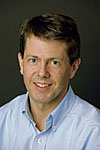PreAmble

At a recent off-campus event in Freeport, French professor Kirk Read got laughs when he said that a Bates education ought to help one distinguish “truth from truthiness” in the news media.
The laughter was in part kudos to Read for his spot-on pop culture reference. “Truthiness” was the 2005 word of the year (as determined by the American Dialect Society) created by Stephen Colbert on Comedy Channel’s parody news talk show, The Colbert Report. Colbert’s character spoofs blustery news pundits. “I don’t trust books,” announced his straight-faced character in 2005. “They’re all fact, no heart.” What is true, Colbert told his audience, is what he feels is true.
The ability to discern truth from truthiness, and to articulate the former, comes through in this issue’s story on Poland Spring’s expansion plans in Maine. Tom Brennan ’83, Andy Tolman ’70, and Keith Taylor ’82 each have dealt with those who would substitute truthiness for the facts. Colbert coined truthiness, of course, in the wake of all that has happened since Sept. 11, 2001. (“Doesn’t taking Saddam out feel like the right thing?” he asked on his first show.) But setting aside cynicism, can we explain the role of emotion and perspective in the construction of “true” personal stories? That’s the topic of researcher Jonathan Adler ’00’s essay introducing five alumni lives since Sept. 11. His essay explains one kind of truth-seeking — how we’ve created our own personal stories from the true-life experiences of Sept. 11, and what those stories say about us and our nation.
On pages 58 and 59 is a question-and-answer article with Kirk Read, whose off-campus appearances were made to thank donors to The Campaign for Bates. From Freeport to the West Coast and on to London and Paris, his easy wit and obvious affection for and knowledge of Bates undoubtedly created fresh connections between Bates people and the College. With that in mind, his interview is within a new magazine department called Connections. This section will share the issues and ideas that Bates people discuss at off-campus Bates events — from Bates Business Network gatherings to meetings of Bates Book Clubs — where people gather in a spirit of Bates generosity.
At this year’s Convocation, poet Robert Farnsworth defined this particular Bates quality as “passing on and being receptive to the voltages of various enthusiasms, and completing these in a shared circuit of ideas, of commitment, of fellowship.”
Anyway, Bates gatherings are where you’ve always gotten societal insights. In Boston in 1921, President Clifton Daggett Gray explained, albeit less wittily than Read, how the world needs “men and women who think straight.” As reported in the inaugural Alumnus, Gray explained how the modern world was becoming a fast-paced “neighborhood.” “About the only places left where one cannot get stock market reports are Greenland and Tierra del Fuego,” he said. “The long-distance telephone makes it impossible to escape insistent calls of business. If we ever need to think straight, it is today.”
Ain’t that the truth.